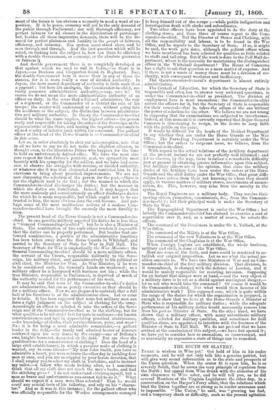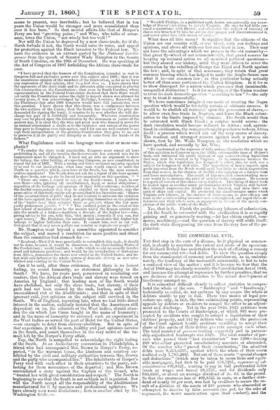THE SOUTH ON SLAVERY.
THERE is wisdom in Wise yet! Get hold of him in his cooler moments, and he will not only talk like a genuine patriot, but will give very sound information as to the state and prospects of the Union question. When the orator fit is upon him, he is so severely South, that he seems the very principle of repulsion from the North ; but appeal from Wise drunk with the stimulus of his own eloquence to Wise sober, and he will tell you, as he did several Members of the Virginia Legislature the other day, in a conversation on the Harper's Ferry affair, that the relations which bind the Union together are so strong as to render severance next to impossible. "The Union," he said, was "growing too fast, and a temporary check or difficulty, such as the present agitation
seems to present, was inevitable ; but he believed that in ten years the Union would be stronger and more consolidated than ever it has been." So that mortal affairs like that of Harper's Ferry are but "growing pains ; " and Wise, who talks of sever- ance, loves the Union, "not wisely but too well !"
Nor will the Union be depraved by a new slave-trade, for if the North forbade it not, the South would raise its voice, and appeal for protection against the Black invasion to the Federal law. We have the evidence in an extract quoted by the Nationa/ Intelli- geneer from the speech of Senator Wade Hampton in the Senate of South Carolina, on the 10th of December. He was speaking of the Act of Congress of 1807 forbidding the African slave-trade for ever.
"I have proved that the framers of the Constitution intended to vest in Congress full and exclusive power over this subject after 1808; that it was the unanimous opinion of the members of the Convention, as far as we have any expression of that opinion, that they had done so. I have shown that the opponents of the slave trade and its advocates alike concurred in placing this construction on the Constitution ; that even in South Carolina, whose representatives in the Federal Convention declared that their State would not ratify the Constitution unless the right to import slaves was allowed for twenty years, it was acknowledged by Rutledge, Lowndes, Barnwell, and the Pmckneys that after 1808 Congress would have full jurisdiction over this question. I have shown that this clause was a compromise between the two sections of the Union ; that the South has received the price she demanded for signing the bond; it remains to be seen whether she will dis- charge her part of it faithfully and honourably. Whatever construction may now be placed upon the Constitution by the statesmen or jurists of the present day, it is clear that the wise and great men who framed it never fer an instant entertained a doubt as to the existence and extent of the power they gave to Congress over this matter, and I for one am well content to ac- cept their interpretation of the glorious Constitution they gave to us, and to preserve it in its purity and integrity as it came from the hands of its fathers."
What Englishman could use language more clear or more em- phatic?
"To render the slave trade practicable, Congress must repeal all laws prohibiting it, and all the treaties the Government has entered into for its suppression must be abrogated. I need not go into an argument to show the fallacy, the utter futility, of expecting Congress, as now constituted, to repeal the act of 1807. With a strong and bitter sectional majority opposed to us and to our institutions, what sane man would expect to unite the North on a question which, even here at the South, has the most earnest, zealous opponents? The South does not ask for a repeal of the laws against the slave trade, nor can she be forced into unanimity on this question. * *
"There are some, I regret to say, at the South—none, I trust, in our own State—who, ignoring all constitutional, legal, or moral obligations ; regardless of the feelings and opinions of their fellow-citizens; reckless of the fearful consequences that may be entailed on their country, urge the prosecution of this traffic on the sole ground that it is a lucrative one. Slaves of the accursed thirst of gold,' they do not hesitate to advocate the violation of the laws against the slave trade; and, placing themselves on the platform of the higher law,' they eulogize those as patriots whom the law more justly pronounces pirates. * * * The cardinal point in the creed of this new school of moralists must be the maxim which the Roman satirist puts into the mouth of a father—doubtless a disciple of the higher law—who, giving advice to his son, tells him, 'Get money ; honestly if you can, but —get money.' Mr. President, the morality that inculcates this higher law belongs to higher latitudes than ours. It cannot take root in our soil. God grant that it may never pollute our country or degrade our people."
Mr. Hampton went beyond a committee appointed to consider the subject, and moved a resolution far more positive and direct than the committee had stomach for :—
"Resolved—That if it were practicable to reestablish this trade, it should not be done, because it would be disastrous to the slave-holding States of the Confederacy ; would institute a traffic which would necessarily involve cruel and inhuman practices ; and would, by the introduction of barbarians from Africa, demoralize the slaves now owned in the United States, and in- fect with evil influence the whole system of domestic slavery as now esta- blished and existing in the United States."
Can it be said, after these evidences, that there is no honest feeling, no sound humanity, no statesman philosophy in the South ? We have, for years past, persevered in reminding our readers, that the African slave trade and slavery were forced on America by England; that leading men of the South would have abolished, not only the slave trade, but slavery, if their path had not been crossed by the rash, lawless, and selfishly unconsidered riot of the Abolitionists ; and, that in spite of that ignorant raid, just opinions on the subject still survived in the South. We of England, repenting late, when we had little direct interest in the matter, suddenly insisted that the Americans still dependent on us, the colonists of the West Indies, should aban- don the sin which Las Cases taught in the name of humanity ; and in the name of humanity we enforced such an experiment in the West Indies as served the part of Helot for the United States, —an example to deter from slavery-abolition. But in spite of that experience, it will be seen, healthy and just opinions survive in the South, and assert themselves in the very midst of the tu- mult left by the Harper's Ferry affair.
Nay, the North is compelled to acknowledge the right feeling of the South. At an Anti-slavery convention in Philadelphia, a friend who had accompanied Mrs. Brown to Harper's Ferry, re- ported, "in the warmest terms, the kindness and courtesy ex- hibited by the civil and military authorities towards Mrs. Brown and the pally who accompanied her." The inhabitants of Harper's Ferry vied with each other in their attentions to the party, col- lecting for them mementoes of the departed ; and Mrs. Brown contradicted a story against the Captain of the Guard, who "treated her with great consideration and respect." The North is I beginning to see that the South is not so black as it is painted. Nor 'will the North accept all the responsibility of the Abolitionism
manufactured for it by maniacs and professional agitators. We have already seen some disclaimers ; here is another cited by the Washington Globe:—
" Wendell Phillips, in a published card, denies unequivocally any know- ledge of Brown's intention to invade Virginia. He says he had little per- sonal acquaintance with Brown ; and whenever the subject of running off slaves was broached by him he always discouraged and discountenanced it, and never aided him with money or advice."
What does all this mean ? It signifies that the citizens of the Union are our cousins still, of our blood, with our feelings and opinions, and above all with our law and trust in law. They may not have the advantages which we possess in the old monarchy-- that great fty-wheel of our commonwealth, that grand reserve for keeping up national action on all unsolved political questions-- but they shared our history, until they were driven to sever the connexion by the rebellion of George the Third and North against the law ; and, in spite of that severance, they retain that great common blessing which has helped to make the Anglo-Saxon raoe what it is—our common law ; in this particular being actually better off than some portions of the United Kingdom. Is it for us to show disrespect for a nation which possesses that inestimable, unequalled distinction ? Is it for us to object if the Union resolves to treat its dark domestic question according to law" ?—the only way to treat it successfully.
We have sometimes imagined one mode of treating the Negro question which would be tolerably certain of ultimate success. It would be to abolish all restraint upon the possession of slaves,— to allow even free trade in Negroes, and leave the Black coloni- zation to the limits imposed by climate. The South would then be saturated with Black blood ; a surplus would accrue ; the dark circulation would become refluent to Africa; and, appren- ticed in civilization, the remigrants might perchance redeem Africa itself ; a process which would cut off the very source oislavery. The readiest and strongest reasons against such a process are shown, first by Mr. Wade Hampton in the resolution which we have quoted, and secondly by Mr. Wise.
"lie condemned as the supreme of folly and pufillanimity the getting up of this agitation in Congress upon the little, contemptible issue of Helper's book, and intimated his entire distrust of any countervailing legislation that may now be resorted to by Virginia. As to commerce between the States, which this legislation was designed to effect, this, be said, was a subject for Congress to deal with. The imposition of heavy imposts upon goods imported from the North would avail but little to check importation from that source, in the absence of facilities for carrying on a foreign trade and home manufactures. The result of this so-called countervailing mea- sure would be to increase the price of articles to the consumer. He seemed to regard all resorts of this character as fruitless. This thing of direct trade he looked upon as needing many preliminaries which Virginia still lacked. Her internal improvements should first be finished, and then there was need of ships and capital. He presented the disadvantages under which Virginia now labours, in the absence of those means, to give efficacy and force to the countervailing measures now contemplated, and urged these de- ficiencies and their effects now, as arguments in favour of the speedy com- pletion of the public works of the State."
Yes, that is it. Finish the preliminary labours of colonization, —let the South be saturated with the civilization it is so rapidly gaining and so generously rearing,—let her obtain capital, com- merce, machinery,—and the question of slavery will settle itself; the dark stain disappearing for ever from the very face of the po- pulation.



























 Previous page
Previous page